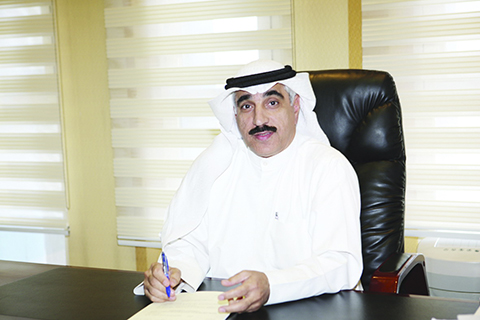These include KTV 1, KTV satellite, Channel 2, which addresses two-thirds of the local population, two sports channels - one for the youth and the other for sporting events, the Arabi satellite channel for culture and arts, Ithra'a for religious issues and Kuwait Plus, which is parallel to KTV 1. Each of these channels has its own audience depending on their interests," he told Kuwait Times.
Mostafa, before assuming his current post two and a half years ago, was the assistant undersecretary for news and political programs for a year. Prior to that, he was the undersecretary for Kuwait Radio for a year and half. Before that, he was a TV anchor for many years. Mostafa has won many local and regional awards during a career spanning 35 years, which has made him capable to run any department at the ministry of information.
During the Iraqi invasion of Kuwait in 1990, Kuwaiti Radio was broadcasting under the slogan 'Here is Kuwait' (Huna Al Kuwait). Mostafa was one of those who soldiered on from Aug 1 till the liberation on Feb 26, 1991. "At that time, Kuwaiti media was much respected around the world. Kuwait Radio didn't stop broadcasting, and we shifted from Kuwait to Saudi Arabia on the fifth day of invasion, and received full support from them.
They provided the facilities for us to be able to broadcast. Also, the TV channel was aired from Saudi Arabia during the seven months of the invasion," he recounted. "We announced the liberation of the Kuwaiti islands first and returned to the ministry of information. The studios were damaged by the Iraqis and they had ransacked and stolen the national radio and TV archives. Fortunately, we were able to reconstruct what was destroyed, and we gained international respect," Mostafa recalled. Other excerpts from the interview:
Kuwait Times: What do you have to say to some producers of TV programs who have complained of corruption in the ministry and particularly the TV sector?
Yousef Mostafa: This is not true anymore, especially after Sheikh Salman Al-Homoud was appointed minister of information and state minister for youth affairs. Sheikh Salman rectified the mistakes in all the sectors of the ministry and not just the TV department.
The change at Kuwait TV is noticeable in all its channels and new content. The executive committee chooses submitted works carefully, as the minister included representatives from various bodies in this committee as members, including finance, planning and development, legal, higher institute for theatre arts and the artists' association. The committee chooses the most suitable works according to the official media vision, which then receive financial and media support.
KT: What about censorship?
Mostafa: We have active censorship for TV - a censorship committee monitors all broadcasts. We are glad that families can safely watch all KTV channels without being worried that their children may see any inappropriate content. Whatever is broadcast is in line with our customs and traditions. Censorship of local dramas is done before and during the shooting, after producing them and while showing them. A team from KTV attends the shooting at various locations, and if they notice any violations in the contract or mistakes, the makers will be informed to correct them. They are usually very cooperative, so we don't register any violations.
KT: What's new at KTV? Tell us about future plans.
Mostafa: Several engineering projects have been executed, as well as establishing broadcast centers and new stations that work with the high definition (HD) system, which is the technology currently used for satellite broadcasting internationally. All Kuwait channels will be broadcast on both Nilesat and Arabsat, so viewers all over the world will be able to watch these channels in high quality. KTV can compete with the best satellite channels. We will even switch to a system newer than HD soon. According to many surveys, KTV is still one of the leading channels and has many local and Arab viewers because of the various dramas and cultural, religious, touristic and development programs shown.
KT: What about content for non-Arabic speakers?
Mostafa: KTV 2 has changed its strategy, which was appreciated by non-Arab viewers through their feedback. This channel also broadcasts some programs and news shown on KTV 1. As a new addition, we have started translating and dubbing some local dramas and soap operas to give the opportunity for these viewers to enjoy watching them. Even some folk songs have been translated.
By Nawara Fattahova, Staff Writer



